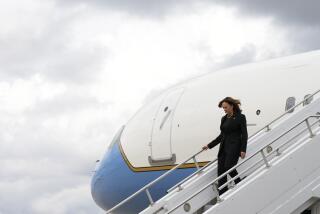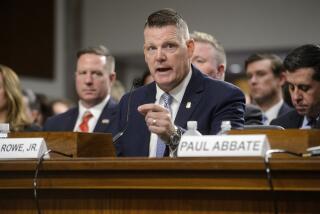Airline Defends Banning Bush Guard From Flight
- Share via
WASHINGTON — The armed Secret Service agent had boarded the plane, shaken hands with the pilot and buckled in for departure when a mechanical problem sent everyone back to the gate.
The Arab American agent, a seven-year veteran of the service en route from Baltimore to Texas on Christmas to guard President Bush, would have to take another flight.
What happened next on American Airlines Flight 363 is the focus of a Secret Service investigation and a threatened lawsuit--a tangle of events that offers a glimpse into the psychology of both sides of the debate over using ethnic or racial profiling in the post-Sept. 11 world. At issue is the discretion of pilots to keep passengers they deem a security risk off their planes, even if the person has cleared security checkpoints.
The agent charges that he was singled out solely because he is Arab American. The airline says its pilot did what was necessary to protect his passengers from an armed individual who became verbally abusive during questioning.
What had been a relatively quiet matter--with Bush saying last week he’d be “madder than heck” if profiling was involved--exploded Thursday in an exchange of accusations between lawyers for the agent and officials of the airline, with each side accusing the other of misrepresenting the truth.
This much is clear: Instead of an easy boarding on his new flight, which had been held for the rerouted passengers, the agent rapidly came under suspicion from a worried pilot who questioned his credentials.
John Relman, a Washington attorney who represents the agent, said his client’s goal “is to try to get procedures and policies changed so pilots do not have unfettered discretion. It’s not about money. It’s about making sure this doesn’t happen again when there is no legitimate security concern.”
In a brief statement read by his attorneys, the agent said “it has never been my desire to make this incident personal.”
The agent was identified as Walid Shater by the Washington Post; his attorneys declined to release his name but said he is a 33-year-old father of two. The agent complained last week to the American Arab Anti-Discrimination Committee about his treatment, telling officials there he felt he had an obligation to come forward because he believed his civil rights had been violated.
Islamic advocacy groups and other civil rights activists have pointed to the Secret Service agent’s case as the most extreme example of what they allege has been a string of abuses by the airlines, which are not allowed under law to use ethnic profiling in making security decisions.
But pilots groups, backed by the airlines, say a pilot’s authority to determine who is safe to transport is vital and should not be changed.
“The captain of an airplane, like the captain of a ship, is fully and totally responsible for everything that goes on on that flight, and he must have enough discretion to act if he believes there is any threat against the airplane,” said Capt. John Cox, a security specialist for the Air Line Pilots Assn.
In an unusual step, American Airlines on Thursday released the pilot’s incident report as well as a detailed account written by an airline security official, saying it was “obligated” to respond to the allegations.
The release of the reports, which portray the agent as “nervous and anxious” as well as “confrontational,” came a week after American Airlines officials said they had offered an apology to the agent for the misunderstanding. At the same time, the airline said it backed its pilot’s decision.
The two accounts--one given by lawyers for the agent at the news conference and the other contained in the American Airlines news release--seem barely recognizable as the same event. About 90 minutes passed from the time the agent was asked to leave the plane to the time it took off without him--making him a day late for reporting to duty with the president’s security detail at Bush’s ranch in Crawford, Texas.
The agent said he was asked to leave the plane by an American Airlines employee--along with several other passengers--for additional security checks. He told his attorneys he took his carry-on baggage with him, informing the flight attendant he had left his coat and other articles behind but would be back.
The pilot’s report said flight attendants told him they were “concerned” about the actions of the armed passenger. The pilot said the agent had left the plane with his carry-on items still in his seat, telling the flight attendant not to leave without him. Once he was gone, a flight attendant noticed books with “Arabic-style print” that he had left behind and informed the pilot.
The book in question, the agent’s attorneys said Thursday, was an English-language text titled “The Crusades Through Arab Eyes” that he had ordered from Amazon.com. He speaks Arabic but is not literate in the language, his attorneys said. The man sitting next to the agent has come forward to say the flight attendant saw the book after riffling through the agent’s possessions once he left the plane.
When the agent returned to the plane, the pilot said he took a closer look at the paperwork allowing him to carry a weapon onto the plane and found discrepancies, saying the forms were unreadable and had missing items.
The pilot at that point said he came out of the cockpit to speak to the agent, who “appeared nervous and anxious.”
According to the security official, who was contacted by the airline’s Texas headquarters, the pilot “first requested a fax containing all wanted terrorist photos American [Airlines] had available.”
The pilot was told that was not possible and was asked what sort of problem he was encountering. He told the security official that he had an armed passenger who said he was a Secret Service agent who carried paperwork with flight numbers scratched out.
The agent’s attorneys said the changes were made by an American Airlines desk agent. Another copy of the form was filled out by the Secret Service agent, but it also was considered incomplete by the pilot.
The pilot then asked the security official to fax him a copy of a Secret Service credential to verify that it was the same as the credential carried by the agent. The agent’s attorneys say that by that point, his credential already had been checked by three local law enforcement officials.
According to the American Airlines security officer’s account, he then advised the pilot to verify the agent’s credentials with local law enforcement officials again, saying they should be familiar with them.
“[The pilot] said, ‘You work for an airline, you know how easy it would be to get a fake ID,’ ” according to the report. The security official then offered to call the Secret Service to verify the agent’s identity and asked the pilot to request a contact number from the agent.
“The captain said that we should not use his information because he could have a friend answering the phone when we called,” the report said.
Federal officials pointed out Thursday that numbers for the White House and Secret Service appear in the front of every phone book.
The security officer said the next call he got was from a ticket agent saying the Secret Service agent had “verbally abused” the pilot. According to the pilot, the agent said he had the “powers of the White House” behind him. But the agent said it was the pilot who was abusive.
After the agent asked the pilot why he was not allowed to board, the pilot responded that the agent should “never address me directly,” according to one of the agent’s attorneys.
“The agent, almost unable to believe his ears, told the pilot that these credentials would get him into the White House,” one of his attorneys, Christy Lopez, said.
In the end, the plane took off without him. The next day, American Airlines rescinded a flight ban they had put on the agent, who was traveling on tickets purchased through the government travel agency and marked as such. The airline flew him to Dallas.
More to Read
Sign up for Essential California
The most important California stories and recommendations in your inbox every morning.
You may occasionally receive promotional content from the Los Angeles Times.














